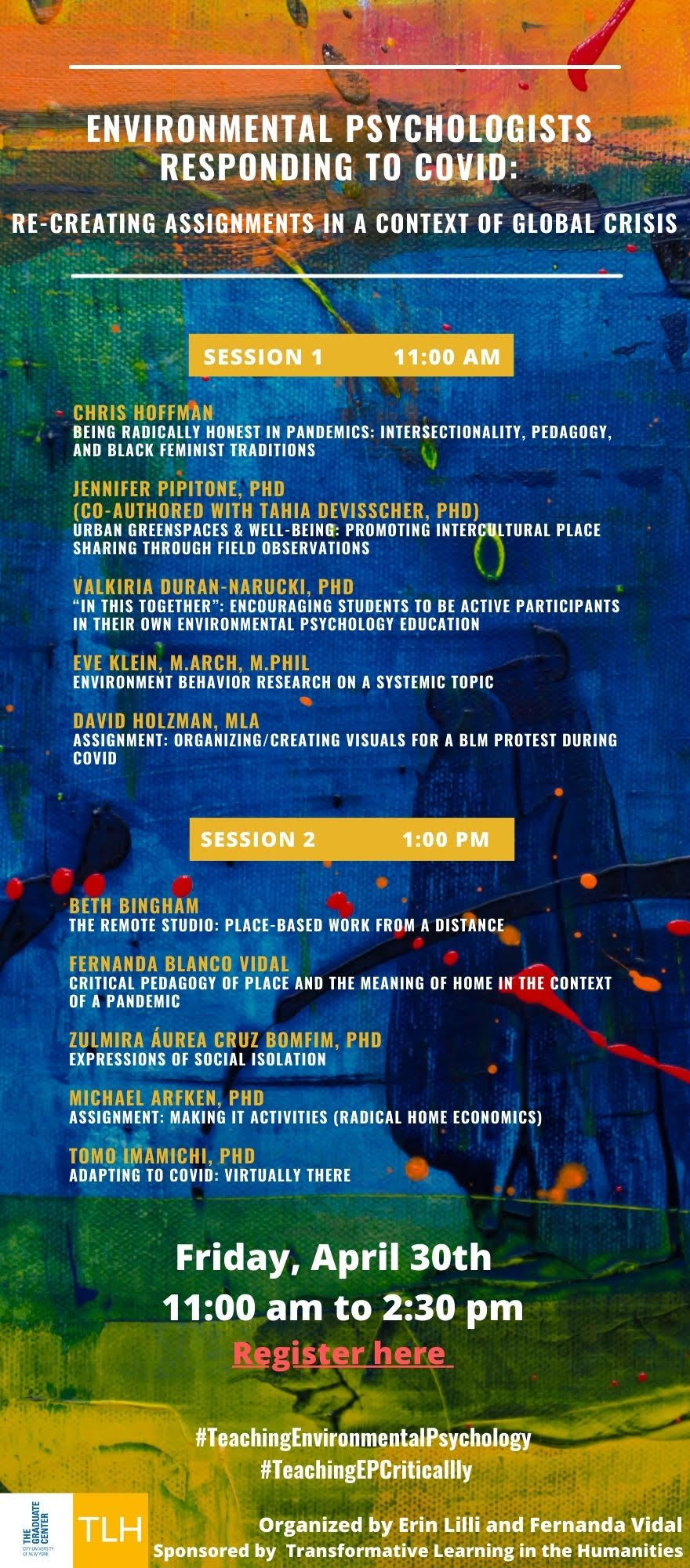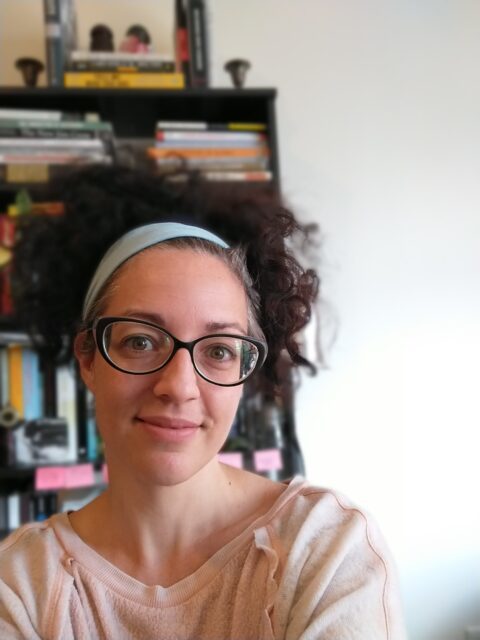Environmental Psychologists Responding to COVID: Re-creating Assignments in a Context of Global Crisis
Fri, Apr 30, 2021
11:00 AM–2:30 PM
This event will take place online via Zoom. Please register below.

Join us for “Environmental Psychologists Responding to COVID: Re-creating Assignments in a Context of Global Crisis” featuring presentations of projects and assignments adapted to address the global pandemic by 10 environmental psychologists from NY, Canada, and Brazil. This event was organized by Erin Lilliand (PhD candidate in Environmental Psychology at The Graduate Center, CUNY, and research associate for Center for Human Environments’ Public Space Research Group) and Fernanda Blanco Vidal(PhD candidate in Environmental Psychology at The Graduate Center, CUNY, and joint Teaching Fellow at the Teaching and Learning Center and the Center for the Humanities’ Seminar on Public Engagement and Collaborative Research), and is co-sponsored byTransformative Learning in the Humanities (TLH).
To participate, please click here to register.
The first graduate training program in Environmental Psychology was created at CUNY more than 50 years ago. This traditional program is still a hub for critical thinking in psychology and correlated environmental areas. Environmental Psychologists are scholars and practitioners who work across disciplines focusing on real-world problems addressing people- place relationships critically. While the issues of culture, politics, inequalities, and environmental injustice were always part
of our classroom discussions, the disruption of COVID-19 has demanded we recreate our approaches and pedagogical strategies to address new and urgent issues. If in prior semesters, fieldwork, outdoor activities, and other experiential learning approaches were common in our pedagogies, the context of the pandemic demanded we rethink those projects to provide safe spaces for students’ experiential learning.
Another important aspect is that many of our students were/ are working on the frontlines of COVID-19 and have lost family members or loved ones; thus, we have strived to create a sense of community and a space for meaningful listening
in our classes. In this seminar, we intend to create a space for Environmental Psychology educators to come together and share, reflect and document their amazing and challenging experiences as educators, focusing on art-based and content- creation projects/assignments developed or adapted in
the context of the pandemic. Having an amazing diversity of students, we also seek a transnational and decolonial approach, creating content beyond the US framework and understanding our students as knowledge producers.
The format intends to be inclusive and involves ten presenters from different CUNY campuses, but also alumni that now are teaching in other colleges. Each presenter will offer a handout with a 5-7 minute presentation of their assignments. The rest of the time will be dedicated to audience engagement and contribution by using active learning strategies such as social annotations, group discussions with instant online polls, and exit tickets to promote feedback.
SCHEDULE
SESSION 1 :: 11:00 AM -12:30 PM (EDT)
INTRODUCTIONS :: 11:00-11:15 AM
PRESENTATIONS :: 11:15 AM – 12:00 PM
11:15-11:22 :: Chris Hoffman, Being Radically Honest in Pandemics: Intersectionality, Pedagogy, and Black Feminist Traditions
In these difficult times, it’s increasingly important to be “radically honest” in our classrooms. In this presentation, I’ll be discussing using Bianca C. Williams’ “Radical Honesty as Pedagogy” in the virtual classroom during the COVID 19 Pandemic. I believe this piece not only helps me create an intimate atmosphere with students, but also: acknowledges the many inequalities in our world today and how they personally affect us, helps begin a conversation on whiteness, and introduces students to Black feminist theory and critiquing objectivity within the field of psychology. I believe all three of these are uniquely helpful in times of pandemics and inequality, as well as essential for the field of environmental psychology.
11:22-11:29 :: Jennifer M. Pipitone, PhD co-authored with Tahia Devisscher, PhD, Urban Greenspaces & Well-being: Promoting Intercultural Place Sharing through Field Observations
In Fall 2020, we were both teaching environmentally-focused courses that included a unit on how the corona virus will/has changed the way we engage with public space. To promote student-centered intercultural place sharing, we piloted a collaborative assignment in which our students completed an observation of a greenspace in their city, analyzed how the space could be improved to support well-being during the pandemic, and created short videos to share their findings and experiences with one another.
11:29-11:35 :: Valkiria Duran-Narucki, PhD, “In this together”: Encouraging students to be active participants in their own environmental psychology education
The advent of the global COVID pandemic prompted a quick switch from face to face lecturing to full online teaching. Many professors were faced with lack of previous experience in online environments and tools, which in turn highlighted to students their role in their own learning process. Students became aware of how it was their responsibility to take control or ownership of their on learning when they were forced to ask professors basic pedagogical questions about the dynamic and specifics of their courses. This presentation will describe how one professor took this perceived opportunity to implement a participatory process in their environmental psychology online class, prompting students to make decisions on topics and assignments for their class.
11:35-11:42 :: Eve Klein, M.Arch, M.Phil, Environment Behavior Research on a Systemic Topic
In this project the students explore a systemic topic through Environmental Behavior Research. This project includes a presentation and a paper on a topic that should address an issue that bridges societal concerns and physical spaces (like homeland, anti-racism, social gatherings in the time of COVID-19, daily living/working in the time of COVID-19, health and wellness, etc.) This project will include data collection (environment behavior research that can be safely conducted with physical distancing OR using existing data sets), scholarly research, and written analysis. A recommended intervention or proposal for change is optional. For the first part of the project, the professor forms small Research Groups with three students each, based on shared interests. In these groups the students support each other’s ideas and curiosity, advance scholarly and field research, and make a presentation. After the group presentations, each student will write a paper on one aspect of the research topic.
11:42-11:49 :: David Holzman, MLA, Organizing/creating visuals for a BLM protest during COVID
Within the context of COVID and heightened attention paid to BLM, I reconsidered the focus and structure of a final assignment for an introductory course about graphic communication.
INTERACTIVE DISCUSSION :: 12:00-12:30
BREAK :: 12:30-1:00
Feel free to stay on zoom and chat over lunch or step away. Hope to see you for Session 2!
SESSION 2 :: 1:00-2:30 PM (EDT)
RECONVENE :: 1:00-1:05
PRESENTATIONS :: 1:05-1:40
1:05-1:12 :: Beth Bingham, The Remote Studio: Place-based work from a distance
This semester I am teaching a graduate-level studio, working with students from the Historic Preservation and Urban Placemaking & Management programs. Our project area is Atlantic Avenue in Brooklyn, from Barclay’s Center to the waterfront. In a typical studio, students are out in the field immediately, touring the project area with faculty and members of the community or the studio client. They talk to people, talk to each other, talk to faculty and learn a lot on the ground. The first phase of inquiry is to explore the existing conditions of the place, starting with the students presenting on their initial impressions of the project area. Very little of this could happen in the remote teaching environment, so the first assignment has been adjusted. This week students presented their impressions using a range of data found online, and what they shared was incredible, and much more in the psychological realm than in previous semesters. I have some samples that I would bring to this talk, and some ideas about what happened when they could not rely on the typical ways we explore a new place as professionals.
1:12-1:19 :: Fernanda Blanco Vidal, Critical pedagogy of place and the meaning of home in the context of a pandemic
In my years teaching the course, Psychology of People in Place – From Gentrification to Climate Change, at City College, I have developed different pedagogical strategies to support students’ engagement with their surroundings at multiple-scales while exploring their situationality through critical thinking. This Critical Pedagogy of Place is a perspective intended to merge two pedagogical traditions – critical pedagogy and place-based education (Gruenewald, 2020). When the pandemic hit New York during the spring of 2020, we suddenly became intensely conscious of our surroundings and our interactions. Outside spaces quickly became hazardous, while our homes were transformed into workspaces, schools, spaces for worship, gyms, physician’s offices, playgrounds, or even spaces for mourning. Considering the virtual classroom as a place of care and sense-making for my students during the pandemic; I created an assignment focused on the meaning of home for which they have reflected upon these critical changes. Using drawings, affective maps, guiding questions, prompts, and articles discussed prior to the pandemic, the students have written incredible and honest essays making sense of their own experiences through the lens of environmental psychology theories. At the same time they also taught me about their own struggles, conditions, hopes and fears.
1:19-1:26 :: Zulmira Áurea Cruz Bomfim, PhD, Expressions of Social Isolation
The quarantine diaries are written expressions made by students and professors of the Research Laboratory in Environmental Psychology during social isolation, in the first half of 2020 in Fortaleza, Ceará (Brasil), resulting from the Covid -19 pandemic. The main objective of the diaries was to help the group deal with the difficulties and fears arising from social isolation considering the diversity of affections in the environment that they live in.
1:26-1:33 :: Michael Arfken, PhD, Making It Activities (Radical Home Economics)
As part of my Ecopsychology course, students complete a wide range of post-consumer activities that encourage them to reflect on their immersion in consumer society in the midst of a global pandemic, the process of commodification/decommodification, alternative hedonism, and the transition to more environmentally sustainable society.
1:33-1:40 :: Tomo Imamichi, PhD, Adapting to COVID: Virtually there
Adapting to COVID- pedagogical adaptations to remote learning: maintaining presence, relevance, and rethinking field trips. Engagement in the physical environment is a cornerstone of Environmental Psychology, which poses interesting challenges in the context of stay-at-home orders.
INTERACTIVE DISCUSSION :: 1:40-2:15
WRAP UP :: 2:15 – 2:30
Click here or below for the full PDF program with the complete schedule, descriptions, bios and photos of the presenters and organizers and more info about this event:

Participants

Fernanda Blanco Vidal
Teaching Fellow
